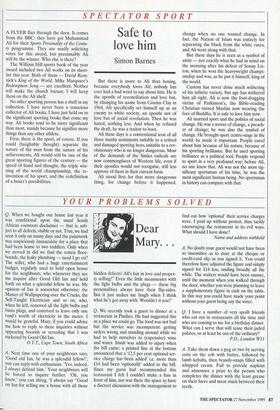SPECTATOR SPORT
Safe to love him
Simon Barnes
A FLYER flies through the door. It comes from the BBC: they have got Muhammad Ali for their Sports Personality of the Centu- ry programme. They are madly soliciting votes for this award, but presumably Ali will be the winner. Who else is there?
The William Hill sports book of the year award included two Ali works on its short- list this year. Both of them — David Rem- nick's King of the World, Mike Marqusee's Redemption Song — are excellent. Neither will make the church bazaar; I will keep ' them on the Ali shelf.
No other sporting person has a shelf in my collection. I have never been a conscious collector of Ali books, I have just held on to the significant sporting books that come my way. Ali books tend to be more significant than most, mainly because he signifies more things than any other athlete.
First, there is the sport, of course. If you could (laughable thought) separate the nature of the man from the nature of his achievements, Ali would still be one of the great sporting figures of the century — the speed of hand and thought, the triple win- ning of the world championship, the re- invention of his sport, and the redefinition of a boxer's possibilities. But there is more to All than boxing, because everybody loves Ali; nobody has ever had a bad word to say about him. He is the apostle of reconciliation and love but, by changing his name from Cassius Clay in 1964, Ali specifically set himself up as an enemy to white society, an apostle not of love but of social revolution. Then he was hated, nothing less. And when he refused the draft, he was a traitor to boot.
Ali these days is a conventional icon of all those mushy sentiments suitable to a retired and damaged sporting hero, suitable to a rev- olutionary who is no longer dangerous. Most of the demands of the Sixties radicals are now commonplaces of Western life, even if their apostles would not recognise, still less approve of them in their current form.
Ali stood first for that more dangerous thing, for change before it happened, change when no one wanted change. In fact, the Nation of Islam was entirely for separating the black from the white races, and Ali went along with that.
But these days he is seen as a symbol of unity — not exactly what he had in mind on the morning after his defeat of Sonny Lis- ton, when he won the heavyweight champi- onship and was, as he put it himself, king of the world.
Custom has never done much withering of his infinite variety, but age has withered him all right. Ali is now the foot-dragging victim of Parkinson's, the Bible-reading Christian turned Muslim now wearing the face of Buddha. It is safe to love him now. Ali married sport and the politics of social change. He was a mover of change, a preach- er of change; he was also the symbol of change. He brought sport centre-stage in the world; he made it important. People cared about him because of his nature, because of his sporting brilliance. But he used sporting brilliance as a political tool. People respond to sport in a very profound way; before Ali, no one knew that. Ali was not the most sig- nificant sportsman of his time, he was the most significant human being. No sportsman in history can compare with that.


























































































 Previous page
Previous page